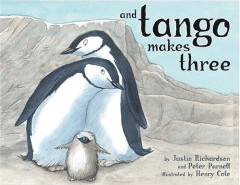 There’s been a bit of media attention in the UK lately around some children’s books which have been appearing as part of a new initiative to increase tolerance and reduce homophobic bullying in schools. Books such as And Tango Makes Three, the story of two male penguins in a committed relationship in Central Park zoo, and King & King, a new twist on the old Prince-and-Princess fairytale, introduce the concepts of same-sex love and relationships to young children.
There’s been a bit of media attention in the UK lately around some children’s books which have been appearing as part of a new initiative to increase tolerance and reduce homophobic bullying in schools. Books such as And Tango Makes Three, the story of two male penguins in a committed relationship in Central Park zoo, and King & King, a new twist on the old Prince-and-Princess fairytale, introduce the concepts of same-sex love and relationships to young children.
There has been the predictable response from religious groups who view such books as ‘forcing’ alternative sexualities on children, or somehow tempting them into homosexuality themselves (see this Guardian article). The alternative case is so frequently mis-represented that it bears stating here: homosexuality, not being a choice, is a reality in the lives of many children and young adults, either by being the offspring or ward of same-sex couples, or, later, being their own experience. Homophobic bullying is so widespread that increased tolerance not only helps kids who are actually gay, but those whose lives are made miserable by homophobic taunts even if they themselves are not gay.
As Elizabeth Atkinson, director of the No Outsiders project which is promoting the books, puts it so well: “What books do not say is as important as what they do.” To deliberately leave images of gay relationships out of children’s books is to censor social reality.
This controversy – over the same books – cropped up a while back in the States, and I wrote about it then for STML, my literary blog (link contains images some consider NSFW). Look there to see the historical background to this debate.
What’s the booktwo angle on this post? Well, there’s not much of one, except to say that technology, it is hoped, can help educators and students circumvent the strictures of religious or state-sanctioned intolerance to free up debate around controversial issues. Organisations such as the ALA use the internet to raise awareness with projects such as Banned Book Week, to keep records of most challenged books, and to advise librarians on how to deal with such challenges. Libraries such as that at UPenn create online repositories of censored works, accessible to all (worth noting that that the current Swotter text, James Joyce’s Ulysses, is on that list). Think Tanks such as the Free Expression Policy Project place book censorship alongside restrictive DRM and aggressive internet filtering on their issue list. The debates will continue, but the new can stand alongside the old in our continuing quest for personal and intellectual freedom and tolerance.
Comments are closed. Feel free to email if you have something to say, or leave a trackback from your own site.